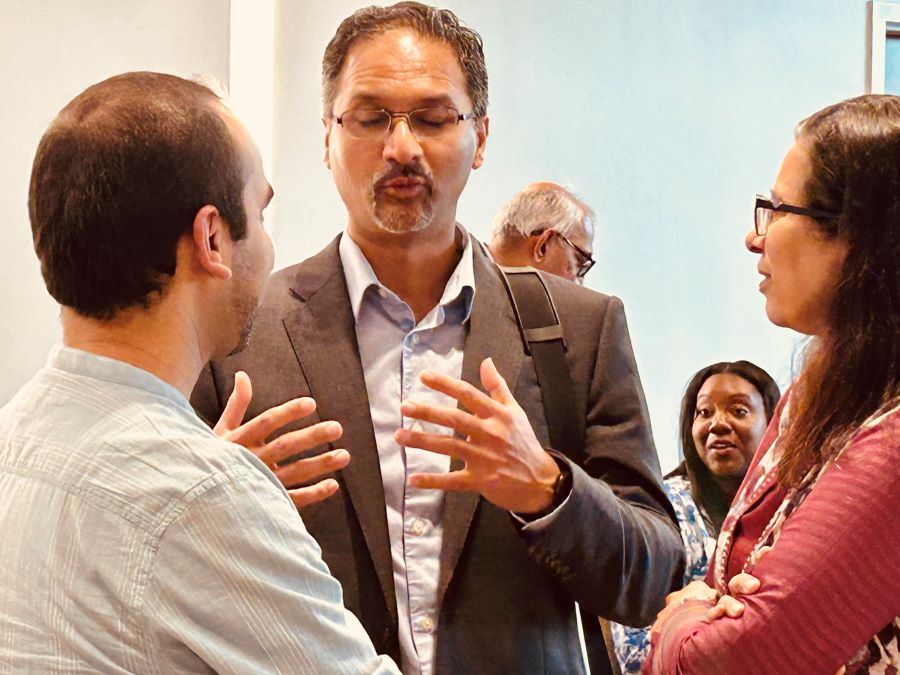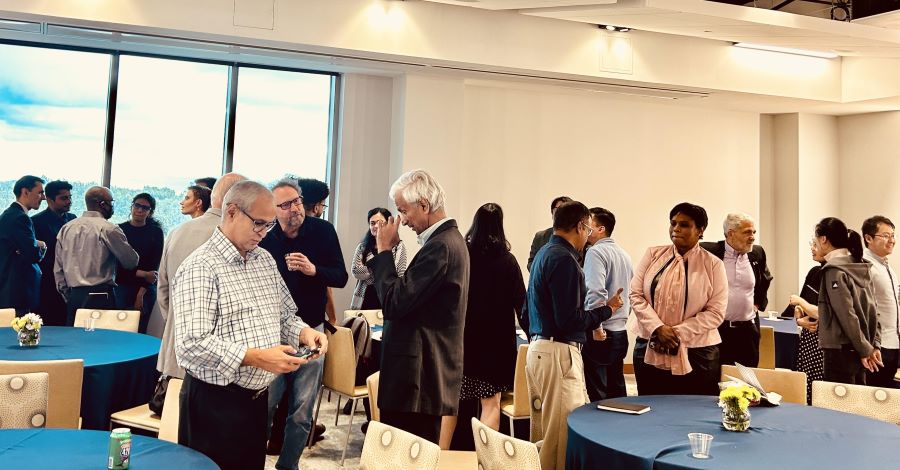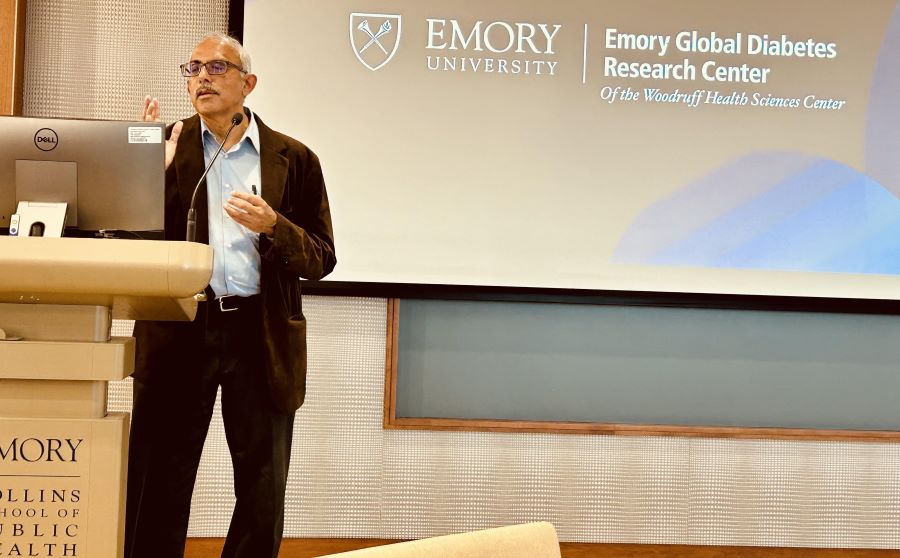BY MEGHANA NAIK
Atlanta, GA, May 23, 2024: It was a very exciting day at Emory University on April 11th, 2024, at the grand launch of the Diabetes Translational Accelerator (DTA) and the introduction of the Lakshmi and Subramonian Shankar Fellowships, hosted by the Emory Global Diabetes Research Center.
Diabetes is a major public health problem that is approaching epidemic proportions worldwide. Globally, there are 537 million people with diabetes, with 80% of the cases occurring in low- and middle-income countries. Worldwide, the prevalence of chronic, noncommunicable diseases is increasing at an alarming rate. About 18 million people die every year from cardiovascular disease, for which diabetes and hypertension are major predisposing factors.
The Emory Global Diabetes Research Center (EGDRC) has announced the launch of the Diabetes Translational Accelerator (DTA), which focuses on advancing research and technologies to address the most challenging issues in diabetes and associated complications.
What is the new Diabetes Translational Accelerator all about? It is unique in that it has a concentrated focus on transforming research into commercially viable products and startups. The DTA aims to boost discoveries and innovation in the important field of diabetes research through valuable coaching, careful mentorship, and access to Emory’s collaborative interdisciplinary community. This community consists of a strong entrepreneurial ecosystem, empowering students, under the mentorship of faculty, to bring their ideas to reality.

The Lakshan Foundation is centrally focused on providing support to this initiative. Crucial to the DTA is the Lakshmi and Subramonian Shankar Fellowship, which provides Emory PhD students in the DTA program with stipends. These doctoral students then take their research to product development and commercialization, creating a greater impact from their PhD projects on a larger scale while being deeply rooted in their doctoral dissertations. The fellowship also grants access to the Shankar Innovation Fund, pushing the translation of discoveries and innovations into viable startups, market-ready products, co-products, and usable technologies. A key aspect is the focus on affordable innovations that can be made available to a large number of people worldwide.
The DTA mentors and supports entrepreneurs in transforming new and modified products/technologies into commercially viable startup products and co-products, which will help in the prevention, diagnosis, monitoring, and treatment of diabetes and related chronic conditions. Emory University will facilitate licensing agreements, ensuring that breakthrough technologies reach larger populations and those who need them most urgently.
Dr. Ravi Thadani, MD, executive vice president for health affairs at Emory University, is thrilled to have such a pioneering program at Emory University. He said: “This initiative is focused on our collective efforts to combat diabetes and its complications through innovation and entrepreneurship. Diabetes causes more deaths per year than breast cancer and AIDS combined, and having diabetes nearly doubles your chance of having a heart attack. The good news is that managing your diabetes can reduce your risk for diabetes complications.”
Dr. Jithin Sam Varghese, co-director of the DTA and faculty member at the Rollins School of Public Health, notes that while there are programs that invest in late-stage dissertation material of post-doctoral fellows, the unique aspect of the DTA and Shankar Fellowships is their support for PhD students from the initial stages of their research, with the end goal of solving problems in diabetes specifically.

The Lakshan Foundation Inc. also supports the Shankar Center for Diabetes at the premier Indian Institute of Technology Madras (IIT Madras) in India. Facilitating a strategic partnership between EGDRC and IIT Madras, Emory’s Shankar Fellows and their faculty advisors will have the opportunity to engage in learning experiences with IIT Madras, fostering international collaboration and knowledge exchange.
Dr. K. M. Venkat Narayan, MD, MSC, MBA, says: “Teams comprising a doctoral student and their mentor will engage with Emory’s entrepreneurial and innovation ecosystem through seminars, workshops, and networking events. This ecosystem includes Biolocity, The Hatchery, Office of Technology Transfer, Goizueta Center for Entrepreneurship and Innovation, Laney Graduate School, Center for the Advancement of Diagnostics for a Just Society, and the Empathetic AI for Health Institute.”
The aim of Emory’s new DTA initiative is to help doctoral students at Emory and their partner, the Indian Institute of Technology Madras (IIT Madras), take their research all the way to product development and commercialization so that they can impact a larger population. It helps the student community incorporate commercially viable startups and their co-products as part of their doctoral dissertation. Emory has a tremendous history in tech transfer, inventions, translations, and it is a foremost university that not only conducts research but also tests treatments with patients and translates findings to public health. Emory is a collaborative community that seeks innovations from leaders, scientists, physicians, engineers, and clinicians. Emory has a culture of translation and has outreach in national, international, and global locations. This collaboration with research facilities around the world encourages healthy and productive interactions with world-renowned scientists and researchers to bring new therapies to patients.
Subramonian Shankar, Founder of Lakshan Foundation Inc., says research in areas that would benefit larger populations and mankind is the entire reason he supports this initiative at Emory University. He added: “A crucial aspect of the program is facilitating collaboration with others who possess innovative and research skills similar to those of Emory students. It’s a global initiative.”
The Diabetes Translational Accelerator (DTA) aims to catalyze the advancement of research and technologies, and through the Lakshmi and Subramonian Shankar Fellowship, the DTA provides stipends for Emory PhD students with the goal of launching their dissertation as a startup. The Shankar Fellows are also eligible for assistance from the Shankar Innovation Fund to translate their research for the market. High impact, affordable solutions that address diabetes and related complications, and can create solutions for the masses, is the main goal for Subramonian Shankar.
Dr. Narayan says that the Emory Global Diabetes Research Center (EGDRC) of the Woodruff Health Sciences Center is an interdisciplinary center comprising faculty from across Emory schools and centers, including the Rollins School of Public Health, School of Medicine, School of Nursing, College of Arts & Sciences, Artificial Intelligence, and Biomedical Engineering.
For more information and to support this initiative in your own way, please contact egdrc@emory.edu or call (404) 712-1021, or email Mark Hutcheson at mhutch3@emory.edu.





